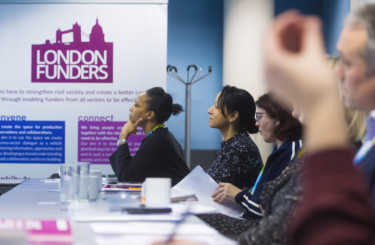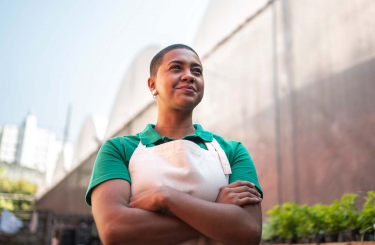Q: First things first, can you tell us a bit more about why and how the Funders for Race Equality Alliance was set up?
The Alliance came about in 2015 over a shared concern amongst funders regarding the entrenched racial disparities in systems and communities in the UK. This was given more urgency following the 2016 Brexit referendum which saw increases in hate crimes.
At that time collaboration amongst funders was happening across different issues but not on race inequality specifically – so the Alliance was a first. The Alliance prioritised working in collaboration with the race equality sector, hosting conversations with race equality organisations to co-create priority areas collectively.
Those agreed areas enabled us to set a longer-term agenda and also grow our Alliance. The Alliance has grown since then and now stands strong with 45 members. Equally Ours – the only pan-equality and human rights network in the UK – has provided the secretariat since 2019. You can read more about how the Alliance came about can be found here.
Q: Why do you think the philanthropic sector has a responsibility and leadership role to play in tackling race inequality?
Guess the question is, why shouldn’t philanthropy have the responsibility? From an historical point of view, where funding has come from and who has suffered in the process of wealth accumulation means philanthropy has a responsibility to tackle race inequality.
And if the aim of philanthropy is to make the world a better place, then the sector has a responsibility to reach those individuals and communities who have been systemically harmed, under-represented and disadvantaged.
When it comes to leadership, funders have a responsibility to ‘look in their own backyard’ – reviewing who (and who isn’t) on your board, asking yourself how your strategic aims support communities facing structural disadvantage, and how your funding processes support or hinder those communities. We have seen a lot of our members do this work and we are supporting funders to do this for the longer-term so that race equality organisation know that this is not a trend but a commitment.
If the aim of philanthropy is to make the world a better place, then the sector has a responsibility to reach those individuals and communities who have been systemically harmed, under-represented and disadvantaged.
Q: Is there anything funders need to ‘unlearn’ in order to give up power? How have you seen that play out in the Alliance?
An area we’re trying ourselves and with our members to unlearn is the need to be ‘perfect’ and get everything right from the start. Sometimes funders can delay action as they are hesitant to act on racial injustice in fear of getting things wrong. It is understandable, but we do not react the same way when it comes to climate change for example. Being comfortable with making mistakes and also being open to learning collectively will impact power dynamics within the philanthropic sector and truly give way for change.
When we talk about ‘unlearning’ we also need to unlearn that racism is not something that ‘comes and goes’. There is a tendency to give racial injustices attention when it’s high on the news agenda but that comes at a cost to the people and communities working to tackle race inequality as well as the people who experience it on a daily basis. Instead of being reactive, it should be about creating meaningful relationships and asking people what do they need to their work meaningfully.
Q: What have you heard from Black and Minoritised-led organisations in your networks when it comes to funders shifting power? What do they want to see and do they think progress is being made?
We can’t generalise for the whole sector but what we’re seeing from our Racial Justice Audit is that there is a strong need to fund racial justice work and organisations tackling root causes.
Being comfortable with making mistakes and also being open to learning collectively will impact power dynamics within the philanthropic sector and truly give way for change.
Q: Finally – what’s next for the Alliance?
Commitment and demonstrating progress towards funding through a racial justice lens is a key priority for us as an alliance.
Part of tracking that progress is through our annual Racial Justice Audit, which is a key way of measuring progress and helping to increase sustainable and flexible funding for Black and Minoritised-led organisations. Our priority now is to build on the learning from previous audits and collect data that can help us understand not just who applies for funding but how much they are asking for. We know anecdotally that Black and Minoritised-led organisations tend to ask for a lot less in their applications so we want to understand why this may be the case and to support them in accessing the right level of funding to carry out complex work.
The Alliance is also currently collaborating with Future Foundations UK and Ten Years’ Time to curate a programme to improve the experiences and support those racialised and minoritised individuals working in the philanthropic sector (more on how you can get involved with this work below).
We think the Alliance has so much potential to provide a space where funders can learn and hold each other to account to push the race equality agenda forward. We know this movement is only just beginning, and we’re hoping to not only grow our member base but also the philanthropic sector’s commitment to race equity. Find out more about how you can join here.
How can we better support racialised and minoritised staff working in trusts and foundations?
Focus Group Invitation - (Monday 3rd April, 6pm - 8pm)
Via Zoom
The Alliance, Future Foundations UK and Ten Years’ Time have been working in collaboration on a programme to improve the experience of racialised and minoritised staff working in trusts and foundations. To ensure the programme addresses the needs of those within the sector, Ten Years’ Time are a hosting focus group.
We are looking to create a pilot programme for racialised and minoritised staff working within trusts and foundations to support them in:
- Navigating and thriving in the sector
- Building a community and network
- Sharing lessons learned, experiences and wisdom
- Accessing wellbeing and learning new skills
… and much more. We are looking to launch the pilot programme in September 2023. It is our hope that we will take the lessons learned from this pilot and establish a yearly programme filled with resources to sustain and support a vital community within the philanthropic sector.
In order to curate a programme that addresses the specific needs of those within the sector, Ten Years’ Time will be hosting a focus group for those that are racialised/minoritised working within the philanthropic sector and are not members of Future Foundations UK. The session will unpack questions on the topic of navigating the sector, challenges, the needs of the sector and wellbeing and support.
The focus group will take place online on 3 April from 18:00 - 20:00 online. Participants will be reimbursed £60 for their time. There are 12 places available for this focus group.
Questions will be sent ahead of the meeting for participants, and there will also be an aftercare session available at a later date.
If this is of interest to you please contact Amel Hamilton from Ten Years’ Time at amel@tenyearstime.com to register your interest before Monday 27th March.


